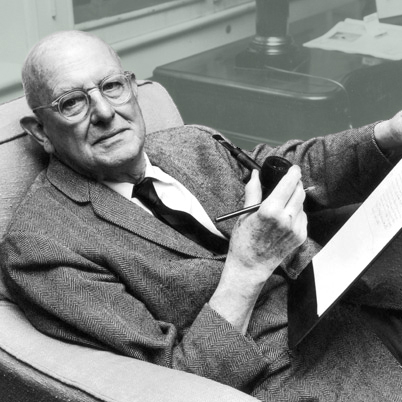
P.G. Wodehouse writes to an old friend from Dulwich College, William Townend. Townend was an unsuccessful writer to whom Wodehouse sent significant financial support over the years. Wodehouse details a recent car accident, before advising Townend on how to characterize the villain in his novel, Peter and the Greek. Wodehouse and Townend compiled their lifelong correspondence in 1953, and titled the collection Performing Flea, a reference to playwright Seán O’Casey’s comment about Wodehouse in the Daily Telegraph: “If English has any dignity left in the way of literature, she will forget forever the pitiful antics of English literature’s performing flea.” The comment came after Wodehouse made a series of ill-advised radio broadcasts from Germany during WWII, which led to accusations of treason. Wodehouse revised Performing Flea extensively, replacing many of Townend’s contributions with his own commentary.
Easthampton
Long Island, USA
July 23, 1923
Dear Bill,
Have you ever been knocked over by a car? If not, don’t. There’s nothing in it. I was strolling along yesterday evening to meet Nora who had gone down to the station in our Buick, and half way [sic] to the village she sighted me and pulled in to [sic] the pavement. The roads here are cement, with a sort of No-Man’s Land of dirt between pavement and road. I had just got onto this when I saw a Ford behind our car. Naturally I thought it would pull up when it saw that Nora had stopped, but it must have been going about forty miles an hour, for I suddenly observed with interest that it couldn’t stop and was swinging in straight for me on the wrong side of the road to avoid colliding with the Buick. I gave one gazelle-like spring sideways and the dam [sic] thing’s right wheel caught my left leg squarely and I thought the world had ended. I took the most awful toss and came down on the side of my face. Broke honble glasses and skinned my nose, my left leg, and right arm. Otherwise pretty sound. This morning all sort of unsuspected muscles and bones are aching, and I can hardly move my right arm. But, my gosh, doesn’t it just show that we are here today and gone tomorrow! If I had been a trifle less fit and active I should have got the entire car in the wishbone. Oh well, it’s all in a lifetime.
Last night I went to bed early and read Peter the Greek. For the first half I thought it was the best thing you had ever done, full of action and suspense. But, honestly, as you seem to think yourself from your letter, it does drop a bit after that. […] Mogger, whom you have established as a sinister menace, gets his teeth drawn too quickly. In the first place he is weakened by that scene with Teame where Teame swats him. Error, I think, ever to have your villain manhandled by a minor character. Just imagine Doctor Moriarty punched by Watson.
A villain ought, until the very end of the story, to be a sort of scarcely human invulnerable figure. The reader ought to be in a constant state of panic, saying to himself ‘How the devil is this superman to be foiled?’. The only person capable of hurting him should be the hero. […] Taking Moriarty as the pattern villain, don’t you see how much stronger he is by being an inscrutable figure and how much he would have been weakened if old Conan had switched off to a chapter showing his thoughts?
[…]
I say, laddie, you’ll never guess. Reconciliation with Old Brook!!!! I came to the conclusion that it was silly to let a quarrel go on for ten years, so I wrote him an amiable letter, in reply to which I got enclosed!!!! He doesn’t seem to have altered much, what? The only difficulty is that I don’t in the least want to see him again, and now I suppose I shall have to.
[…]
Jenkins’ death was a great shock to me. I was very fond of him. I always had an idea that he would not last very long. He simply worked himself to death. He was just a fragile thing with a terrific driving mind and no physique at all, one of those fellows who look transparent and seem always tired. I actually had a clause in my contract that, if he should die, the contract lapsed. One used to wonder how long he could possibly last. He shirked his meals and exercise and concentrated entirely on work. You can’t do it.
[…] I’ve given Conrad one more trial and find he is not for me. His leisureliness gets on my nerves. […]
I wish I could have a couple of hours with you now. I am undergoing one of my periodical fits of depression about my work. I don’t seem to have the vim I used to have. But it’s probably due to the hot summer and the fact that I have just been working rather hard on a musical comedy which didn’t interest me.
So long. Love to Rene. I hope she is getting better every day and that you’ll soon be able to come back to England. Do write me a line at the Constitutional.
Yours ever
Plum
From P.G. Wodehouse: A Life in Letters. Edited by Sophie Ratcliffe. London: Hutchinson, 2011. pp. 153-5
FURTHER READING
Above, Wodehouse writes of his reconciliation with Herbert Westbrook, however he also had a long feud with A.A. Milne.
One of the more damaging events of Wodehouse’s life was his participation of broadcasts in Berlin. Read an article on MI5’s investigation of Wodehouse.
Read an article from The Guardian on the importance of Leave it to Psmith and its lessons for creative writing.


